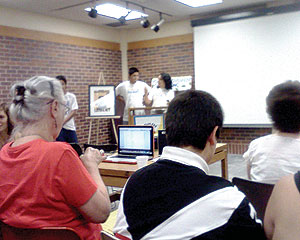
Centro Presente’s screening of The Invisibles brought interested parties from all sides together to examine some of the myths and realities of immigration to the United States by Central and South Americans. - Photo by Carrie Stanziola
By Carrie Stanziola
On August 25, Somerville residents were invited to a screening of The Invisibles, sponsored by Centro Presente as part of their “Somos-We Are” campaign. Somos is the brainchild of the National Alliance of Latin American and Caribbean Communities (NALACC), a two year-old initiative designed to fight xenophobic and anti-immigrant attitudes and laws which dehumanize migrant communities. Among Somos’ campaigns is to petition WBUR to stop using the word “illegal” to describe undocumented immigrants. As Somos argues, actions, not people are illegal. The word “illegal” adds nothing to the immigration debate and does not tell the stories of immigrants.
In addition to a discussion of Latino immigration and the impact of language, participants watched The Invisibles, a documentary created by Amnesty International and Mexican actor Gael Garcia Bernal. While many Americans are familiar with the physical and economic hardships Mexican migrants face in crossing the border, The Invisibles focuses on the oftentimes shocking brutality Central Americans face on their trek through Mexico to the United States at the hands of gangs as well as authorities. As the documentary maintains, these crimes go unpunished.
One young girl, who knew America only through Disney photographs, answered “beautiful” in response to the question of what she thought the country would be. The journey Central Americans endure is anything but. Although men and women are subjected to crime and assault on their journey, women are vulnerable to gender-based violence such as rape. The risk of rape is so well known, in fact, that females often receive a contraception injection before leaving their country so unwanted pregnancy will not be added to the trauma of rape.
However, the documentary also highlighted the work of a hospital that provides life-saving care for injured migrants. A female health provider described encouraging a man not to give up on life after facing amputations. Father Alejandro, who assumes an active role in the hospital, believes that “poor people are the spiritual reserve of the world” and that “the world will tire of neo-liberal capitalism.” As Gael Garcia Bernal argues, Mexico must treat immigrants with respect to be consistent with the demands it makes on the U.S. regarding immigration policy.
After the film, attendees participated in a group discussion in which audience members were invited to share their own stories of immigration. Edgar, a Peruvian immigrant, stated that no immigrant should forget his or her own struggle in crossing the border, no matter how much time has passed. Kevin, a member of Centro Presente, recounted his own migration several years ago, in which he and his family crossed a crocodile-filled river via canoe.
The moderator received thought-provoking responses when she posed the question: why do immigrants come to the United States? One American woman said that it was because immigrants filled the demand for hard-working employees. Erica, a young Guatemalan indigenous woman, challenged her position, arguing that immigrants are forced to come because of the intolerable conditions in their own homelands. In her own country, Erica stated, education is a luxury reserved for the middle-class, and factory workers cannot afford to buy the clothes they themselves produce. Moreover, Erica argued that United States’ intervention has produced disastrous results in Central American nations, citing Guatemala as an example.
Although consensus on just immigration policy cannot be reached in an evening, Centro Presente succeeded in providing faces and stories behind statistics. For one evening, Latinos and Anglos alike came together to express their own views on immigration and to hear the voices of others.
Somerville News readers interested in participating in Somos’ initiative to ban WBUR’s use of the word “illegal” in their reportage are encouraged to e-mail WBUR news editor Dave Shaw at daveshaw@bu.edu or call the newsroom at 617-353-0770. Interested readers can also visit www.nalacc.org for more information.















Reader Comments